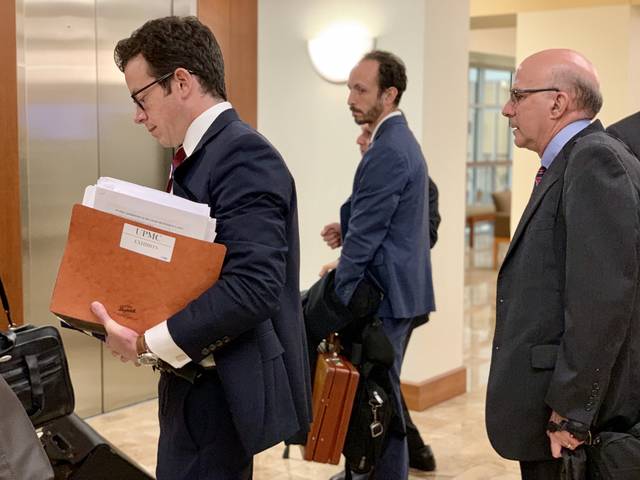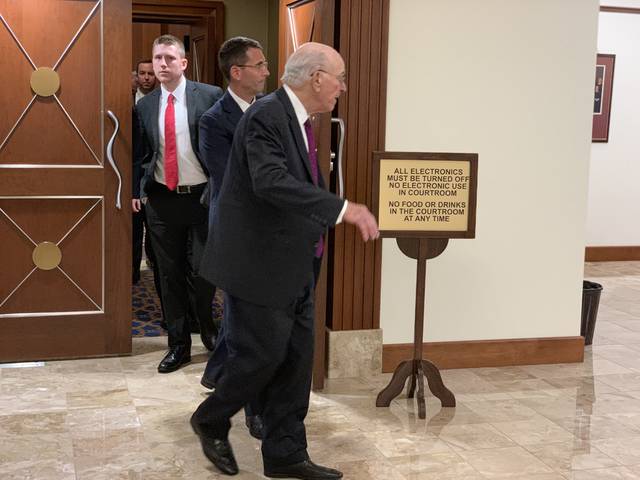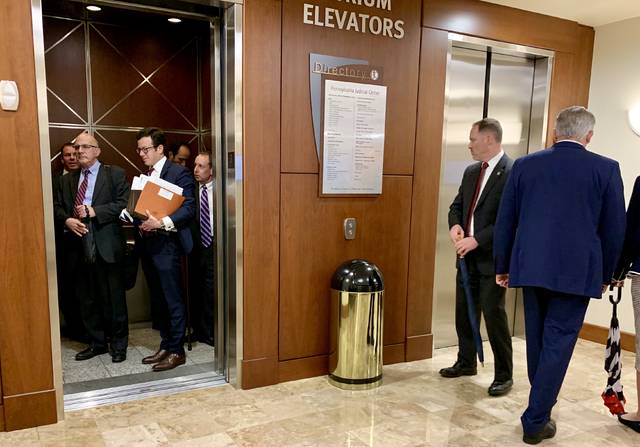AG Shapiro begins making case for blocking UPMC-Highmark split
HARRISBURG — Three types of patients never were supposed to be affected by the insurance network split of UPMC and Highmark — children, the poor and seniors, Jim Donahue of the Pennsylvania Attorney’s General Office said Monday in Commonwealth Court.
State officials decided to intervene in the clash of Western Pennsylvania’s nonprofit health care titans several years ago because the stakes were high and possible negative impacts far-reaching, Donahue testified before a packed courtroom at the Pennsylvania Judicial Center in Harrisburg.
His comments came during the first of two days of testimony in a hearing to decide if the separation agreement between the two insurers can be altered years after is was first approved. Under that agreement, Highmark insured patients no longer will have in-network access to most UPMC facilities and doctors.
UPMC and Highmark were unable to agree on contracts to preserve access to both systems following Highmark’s 2011 acquisition of the former West Penn Allegheny Health Network. Donahue said hundreds of thousands of patients faced losing access to doctors and hospitals at affordable rates.
“We were concerned that UPMC and Highmark, left to their own devices, could potentially kill somebody or bankrupt somebody (by) carrying on their dispute too long,” Donahue testified. “We didn’t know what the future holds and if in five years these guys (would be) going at it again.”
On June 27, 2014, then-Gov. Tom Corbett and Attorney General Kathleen Kane lauded a new agreement, called a consent decree, signed by the Downtown Pittsburgh-based rivals. The deal, set to expire on June 30, was touted as a resolution to protect health care consumers while holding nonprofit leaders accountable.
But, in the weeks leading up to and even after the decree was signed, state officials had lingering qualms and uncertainty about how the rivals’ mid-2019 final split actually would play out, Donahue said. Relations were so heated and contentious that attorneys from UPMC and attorneys from Highmark refused to even be in the same room together while negotiating and signing the documents.
The Attorney General’s Office sought to fold a “modification” clause into the decree that allowed the option to revisit, change and possibly extend the agreement’s terms for the public good, Donahue said.
State Attorney General Josh Shapiro now seeks to use that provision to stop the UPMC-Highmark split from happening at the end of this month.
Donahue — executive deputy attorney general and a lead negotiator involved in executing the five-year-old consent decree — was the first witness to testify in a two-day trial pitting the Attorney General’s Office and Highmark against UPMC. A state Supreme Court opinion last month required the non-jury trial, or evidentiary hearing.
Judge Robert Simpson is tasked with deciding a critical question: Can the court change the June 30 end date of the state-brokered order governing relations between UPMC and Highmark in the name of protecting the public’s interest?
UPMC asserts that the expiration date cannot be changed, and that UPMC executives never would have signed the decree if they knew it could ever be extended without their consent.
The decree merely assured that certain Highmark-insured patients had “temporary access” to UPMC facilities and time to allow for a smoother transition once the UPMC-Highmark divorce became final, UPMC Attorney Leon DeJulius of Jones Day law firm said.
DeJulius questioned the notion that either the Attorney General’s Office or Shapiro actually believed at the time of signing the compromise that the modification clause could be applied to the decree’s expiration date.
Shapiro contends that the modification clause is broad and allows for any of the involved parties, UPMC, Highmark or the state, to ask the court for changes that can be proven to benefit the public interest.
Thomas VanKirk, chief legal counsel for Highmark, took the witness stand Monday afternoon. He testified that, as far as Highmark is concerned, the modification clause could be applied to anything in the decree, including when it ends. He said Highmark merely wouldn’t want UPMC to have the unilateral power to do so without court approval.
“We all had the opportunity to view the consent decree,” VanKirk said. “To me, the modification clause was pretty darn clear that it was not limited in any way, otherwise it would have been spelled out.”
Arguing for Shapiro’s office, Jonathan Goldman further said that UPMC never asked for a “carve-out” to prohibit the modification clause from applying to the end date.
“If you want to make a change to an agreement, you have to speak up,” Goldman said in his opening remarks.
The trial will resume Tuesday morning with witnesses called by UPMC. Potential witnesses include UPMC Chief Legal Counsel Thomas McGough, former Insurance Commissioner Michael Consedine and former state Health Secretary Michael Wolf.
“We look forward to presenting our case and the rest of our evidence, which is very strong,” Wood said.
Judge Simpson said he plans to issue a ruling by Friday.
That will leave just two weeks for the losing party to try to appeal or achieve further recourse before the UPMC-Highmark split as scheduled.
Even if he fails to halt the June 30 breakup, Shapiro will continue to wage legal war against UPMC for months if not years — until he is satisfied the system is acting like a public charity, Shapiro spokesman Joe Grace said.
“No matter what happens this week, we’re not going away,” Grace said.
Wood flatly dismissed Donahue’s claim that the UPMC-Highmark feud threatens the lives and finances of Western Pennsylvanians.
“Anybody who shows up for an ER is going to be well treated… and get some of the best care available anywhere in the world,” Wood said, “and nobody can suggest otherwise.”
UPMC maintains that it has no obligation to offer non-emergency treatment to Highmark patients after June 30 and that it is making an “accommodation” by allowing Medicare Advantage and Hillman Cancer Center patients to do so — concessions UPMC announced just last week.
Highmark’s commercial market patients not receiving oncology care at Hillman Cancer Center still will be subject to a controversial prepay rule as of July 1 at most UPMC hospitals and specialty centers — including UPMC Magee-Womens Hospital, UPMC St. Margaret and UPMC Monroeville. Exceptions include Western Psychiatric Institute, Children’s Hospital of Pittsburgh and hospitals in rural areas.
Remove the ads from your TribLIVE reading experience but still support the journalists who create the content with TribLIVE Ad-Free.



